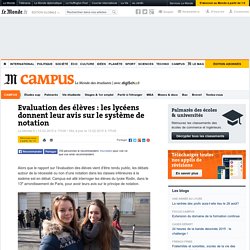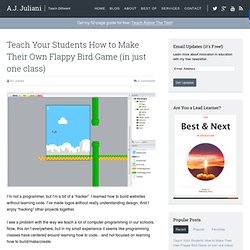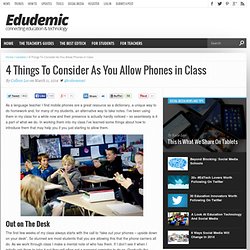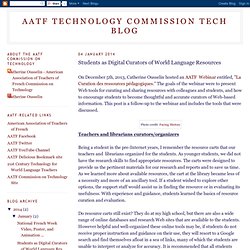

146 useful and (sometimes clever) French words for social media users. Evaluation des élèves : les lycéens donnent leur avis sur le système de notation. Alors que le rapport sur l'évaluation des élèves vient d'être rendu public, les débats autour de la nécessité ou non d'une notation dans les classes inférieures à la sixième est en débat.

Campus est allé interroger les élèves du lycée Rodin, dans le 13e arrondissement de Paris, pour avoir leurs avis sur le principe de notation. « Sans parler des maths, une note, c'est super aléatoire. Avec une même copie, on peut avoir 5 avec un prof et 15 avec un autre. C'est quand même pas très clair. » Serena, 15 ans, en seconde. « Sans les notes, on ne serait plus classé ! « Il y a une différence entre un devoir et son attitude en classe ; ce qui n'est pas vraiment différencié. . « On ne considère pas de la même façon une note et une annotation. . « La note est devenue le reflet de notre travail ou de notre personne. . « Sans, on serait sûrement moins stressé et plus heureux ! « C'est une source de stress.
. « Les notes sont nécessaires à partir du lycée parce qu'il y a le bac. . « C'est juste démoralisant. Creer ma bd. Versal. Create and share visual ideas online. Free Printable French Worksheets at QCFrench.com. Recherche avancée. Teach Your Students How to Make Their Own Flappy Bird Game (in just one class)
I’m not a programmer, but I’m a bit of a “hacker”.

I learned how to build websites without learning code. I’ve made logos without really understanding design. And I enjoy “hacking” other projects together. I see a problem with the way we teach a lot of computer programming in our schools. Now, this isn’t everywhere, but in my small experience it seems like programming classes have centered around learning how to code…and not focused on learning how to build/make/create. I want to get students on a winning streak as soon as possible. I used to teach my 10th and 11th grade students how to make a wordpress website in just one day. I’m not in the classroom anymore, but I still get to run sessions for my school’s “IE Period”. Getting Started in Two Steps If you aren’t sure what Flappy Bird is, read this post. Since then the game has continued to be popular and…copied. I spent the past two days with a group of 10 students building our own Flappy Bird games. Building the Game Now What? @aatfrench.
4 Things To Consider As You Allow Phones in Class. As a language teacher I find mobile phones are a great resource as a dictionary, a unique way to do homework and, for many of my students, an alternative way to take notes.

I’ve been using them in my class for a while now and their presence is actually hardly noticed – so seamlessly is it a part of what we do. In working them into my class I’ve learned some things about how to introduce them that may help you if you just starting to allow them. Out on The Desk The first few weeks of my class always starts with the call to “take out your phones – upside down on your desk”. So stunned are most students that you are allowing this that the phone carriers all do. Silent/Upside Down In the first few weeks of class I start each class the same way by asking them to take out their phone, place them face down on their desks and set to “manner mode” (‘mute’ as it’s called in Japanese).
Use It As They Do My phone is out, on my computer table during class. Consequences When Needed. Blabloo. Students as Digital Curators of World Language Resources. On December 5th, 2013, Catherine Ousselin hosted an AATF Webinar entitled, "La Curation des ressources pédagogiques.

" The goals of the webinar were to present Web tools for curating and sharing resources with colleagues and students, and how to encourage students to become thoughtful and accurate curators of Web-based information. This post is a follow-up to the webinar and includes the tools that were discussed. Teachers and librarians curators/organizersBeing a student in the pre-Internet years, I remember the resource carts that our teachers and librarians organized for the students. As younger students, we did not have the research skills to find appropriate resources. The carts were designed to provide us the pertinent materials for our research and reports and to save us time. On the site below, Corinne Weisberger states that there is a difference between organizing (bundling) and curating (commenting / augmenting) tools. If so, choose Pinterest, Pearltrees, or LiveBinder.